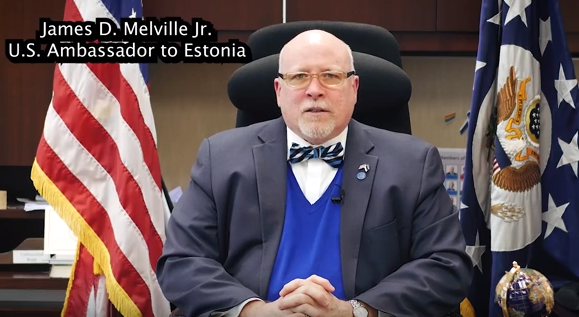 From the Washington Post: The U.S. ambassador to Estonia — a NATO ally bordering Russia — abruptly resigned Friday, telling friends that he cannot abide President Trump’s apparent hostility toward institutions that have stabilized Europe since the end of the Cold War.
From the Washington Post: The U.S. ambassador to Estonia — a NATO ally bordering Russia — abruptly resigned Friday, telling friends that he cannot abide President Trump’s apparent hostility toward institutions that have stabilized Europe since the end of the Cold War.
James D. Melville Jr.’s resignation comes at a crucial moment for independent countries along Russia’s western border — amid the possibility of military conflicts and as Trump suggests he is rethinking the United States’ traditional support for its allies in Moscow’s shadow.
“The honorable course is to resign,” Melville wrote on Facebook. “Having served under six presidents and 11 secretaries of state, I never really thought it would reach that point for me.”
He added: “For the President to say the [European Union] was ‘set up to take advantage of the United States, to attack our piggy bank,’ or that ‘NATO is as bad as NAFTA’ is not only factually wrong, but proves to me that it’s time to go….”
[Excerpts from Melville’s Facebook message]
I truly believe and have said many times, national interests don’t change from one administration to the next. Senator Vandenberg made a great point 70 years ago when he said “politics stop at the water’s edge.” I’ve spent the vast majority of my career on US-European relations and issues, and I’ve always been very proud of the U.S. role in the aftermath of World War II, of rebuilding a Europe that ideally would be “whole, free and at peace.” From the Marshall Plan, through the Cold War and until very recently, supporting Europe’s integration was a fundamental element of U.S. foreign policy which directly undergirds democracy, peace and prosperity.
The E.U. and NATO are the gorgeous and vital fruits of that policy and the world is a much, much better place for their existence. I believe that to my marrow.
From Foreign Policy: The resignation comes ahead of a pivotal NATO summit, where the United States’ closest historic allies fear that Trump will lambast them and further isolate Washington from its allies after heated disputes over trade, defense spending issues, and the U.S. exit from the Iran nuclear deal. Allies fear that the optics of Trump trashing allies in Brussels, followed by a meeting in Finland with Russian President Vladimir Putin, will undercut an already anemic trans-Atlantic partnership.
Image: US Ambassador to Estonia James Melville, March 14, 2018 (photo: US Embassy in Tallinn)
